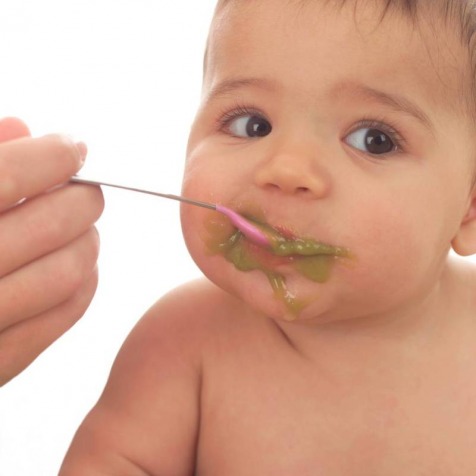Switching baby from breast milk or formula to solid foods can be a stressful time, but it doesn’t have to be. Here are some common questions and answers related to switching baby to solid foods:
When should I start introducing solids?
We now recommend introducing baby to solid foods at 6 months of age. Research has shown the introducing solids earlier may increase the risk for infections or allergies, and can prevent baby from getting enough Calories. Despite the myth: introducing solids earlier does not help baby sleep. Introducing solids too long after 6 months may cause some delays in growth, nutrient deficiencies or aversions to textures.
What foods should I introduce first?
At 6 months of age, baby’s iron stores begin to run out, and breast milk doesn’t provide enough iron. For this reason it is important to offer iron-rich foods at 6 months of age, such as iron-fortified cereals, meats, egg yolk, beans and lentils. Providing a source of vitamin C with iron-rich foods, such as sweet potato, squash, and broccoli will help baby absorb the iron better.
Slowly introduce new foods, one at a time, every 3 days. This allows time to watch if an allergy develops. Introduce foods from a variety of food groups to ensure baby gets adequate nutrients.
*Always breastfeed (or give formula) first before offering solid foods. Milk will still provide the majority of nutrition and Calories at this stage.
What about textures?
Baby needs to start with smooth textures, such as pureed, strained and mashed. Over time, as they develop better oral-motor skills, they can progress to grated, minced lumpy and diced textures. Around 9-12 months baby should be able to handle soft, finely chopped and finger foods.
When can I switch to cow’s milk?
You can start to introduce whole (homo) cow’s milk at 9-12 months of age. If your child is eating solid foods really well, 9 months is ok, otherwise it is best to wait closer to 12 months.
*Soy, rice and other vegetarian beverages do not have the same nutrition as breast or cow’s milk and so are not recommended before 2 years of age.
What foods should I not feed my baby?
- Egg whites and honey should be avoided until one year of age.
- Low fat milk products should not be given to baby until 2 years of age.
- Excess salt and sugar. Extra sugar does not provide nutrients, and salt his hard on baby’s kidneys.
- Allergin foods: if you have a family history of allergies, talk to your doctor or dietitian about which foods to avoid and until what age.
Exclusively breastfed infants (for the first 6 months of life) will need a 400IU vitamin D supplement until 1 year of age, even after they start eating solid foods. Multivitamin drops with vitamins A and C are not required for healthy term infants. After one year of age, babies should continue to get 200IU of vitamin D until they are getting 2 cups of vitamin D-fortified milk per day.
Things to remember:
- All babies are different - don’t compare your child to other children. Let your child go at their own pace, and don’t stress about it
- Don’t take advice from friends and family. Recommendations and research changes all the time. Take advice from a health professional.
- Babies have small stomachs and will not eat a lot right away. Offer frequent meals and snacks, 1-2 tsp at a time, and slowly increase as baby wants it.
- Babies do not need juice! If you’re going to give juice make sure it’s 100% fruit juice and limit to 2-4 ounces in a cup, non-diluted.
- Gagging is normal as baby gets used to new tastes and textures. Choking is NOT normal.


 RSS Feed
RSS Feed

